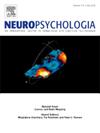“盲目”思维中的模拟:在幻像症中检查无意识的心理意象。
IF 2
3区 心理学
Q3 BEHAVIORAL SCIENCES
引用次数: 0
摘要
幻像症是指缺乏有意识的心理意象,但目前尚不清楚幻像症在多大程度上也涉及无意识的心理意象。概念知识的具身理论认为,词义涉及对感觉和运动经验的模拟;因此,研究模拟可以完善我们对幻觉中意象缺陷的理解,并澄清模拟是否与有意识和/或无意识的心理意象有共同的机制。在本研究中,我们考察了失忆症患者在语言加工过程中是否表现出感觉运动模拟效应。我们招募了104名失语症患者和104名年龄、性别和教育程度相匹配的对照组,他们完成了两项语义处理任务、一项平等判断任务和一系列心理意象问卷。我们观察到模拟效应(即对与更多感觉运动经验相关的单词的更快反应)在失读症和对照组参与者中都存在。我们的研究结果表明,语义处理过程中的模拟可以在没有有意识的心理意象的情况下发生。研究结果表明,无意识的心理意象,通过模拟的方式,可能在幻觉中被保留下来。这些发现也限制了有意识的心理意象和感觉运动模拟可能共享潜在机制的程度。本文章由计算机程序翻译,如有差异,请以英文原文为准。
Simulation in the ‘Blind’ mind: Examining unconscious mental imagery in aphantasia
Aphantasia is the absence of conscious mental imagery, but it is unclear to what extent aphantasia also implicates unconscious mental imagery. Embodied theories of concept knowledge propose that word meaning involves simulation of sensory and motor experiences; thus, examining simulation can refine our understanding of imagery deficits in aphantasia and clarify whether simulation shares mechanisms with conscious and/or unconscious mental imagery. In the present study we examined whether individuals with aphantasia show sensorimotor simulation effects during language processing. We recruited 104 aphantasics and 104 age-, gender-, and education-matched controls who completed two semantic processing tasks, a parity judgement task, and a series of mental imagery questionnaires. We observed simulation effects (i.e., faster responses to words associated with more sensorimotor experience) with both aphantasia and control participants. Our results suggest that simulation during semantic processing can occur in the absence of conscious mental imagery. The findings show that unconscious mental imagery, by way of simulation, may be preserved in aphantasia. The findings also limit the extent to which conscious mental imagery and sensorimotor simulation are likely to share underlying mechanisms.
求助全文
通过发布文献求助,成功后即可免费获取论文全文。
去求助
来源期刊

Neuropsychologia
医学-行为科学
CiteScore
5.10
自引率
3.80%
发文量
228
审稿时长
4 months
期刊介绍:
Neuropsychologia is an international interdisciplinary journal devoted to experimental and theoretical contributions that advance understanding of human cognition and behavior from a neuroscience perspective. The journal will consider for publication studies that link brain function with cognitive processes, including attention and awareness, action and motor control, executive functions and cognitive control, memory, language, and emotion and social cognition.
 求助内容:
求助内容: 应助结果提醒方式:
应助结果提醒方式:


